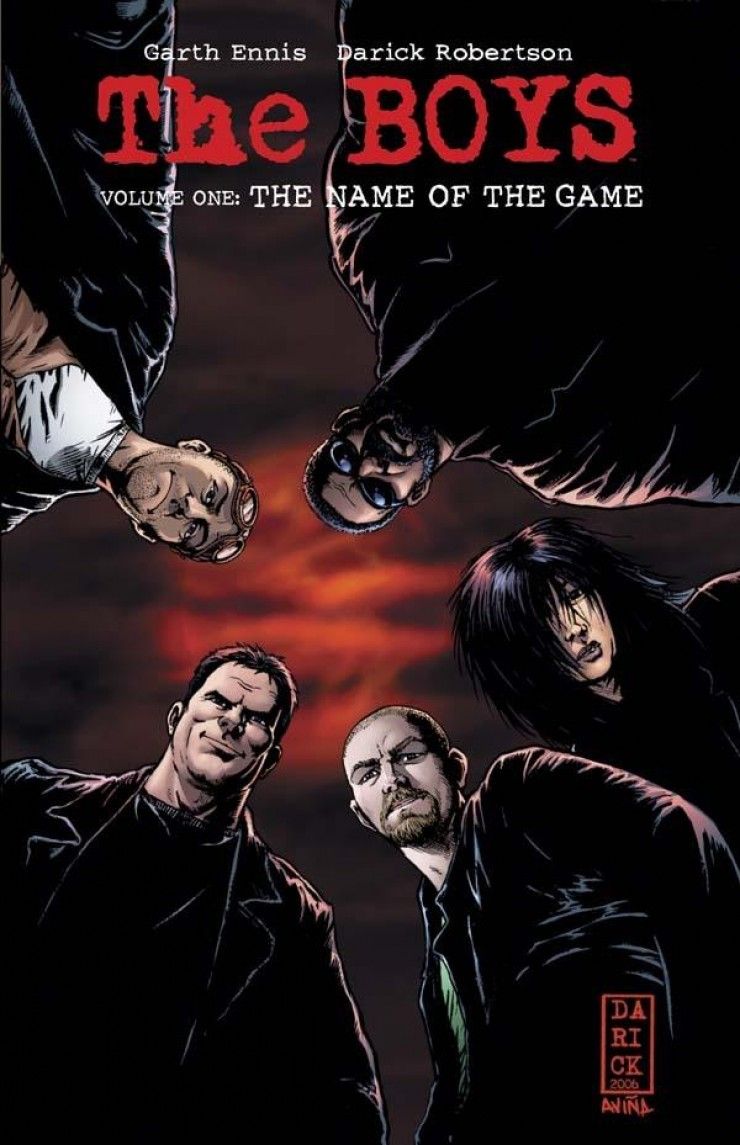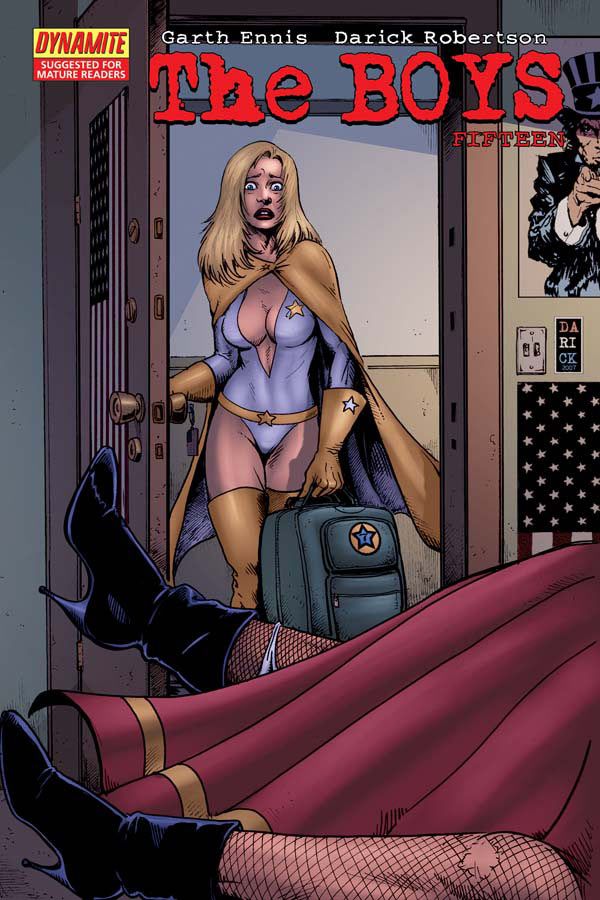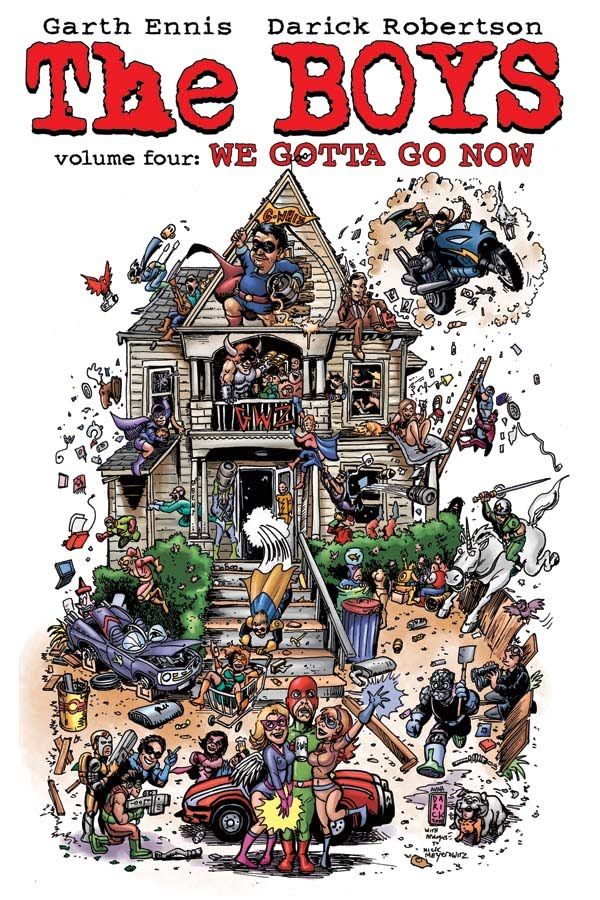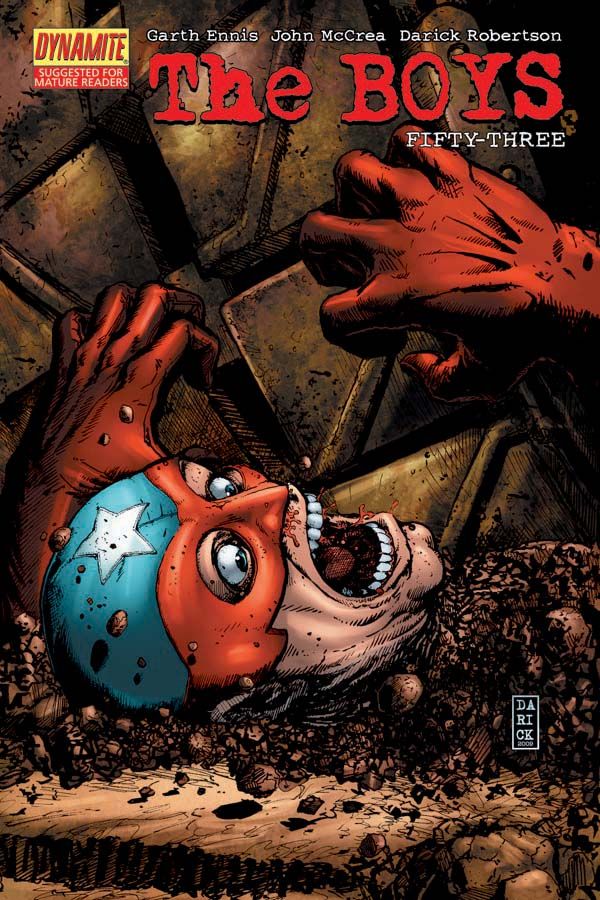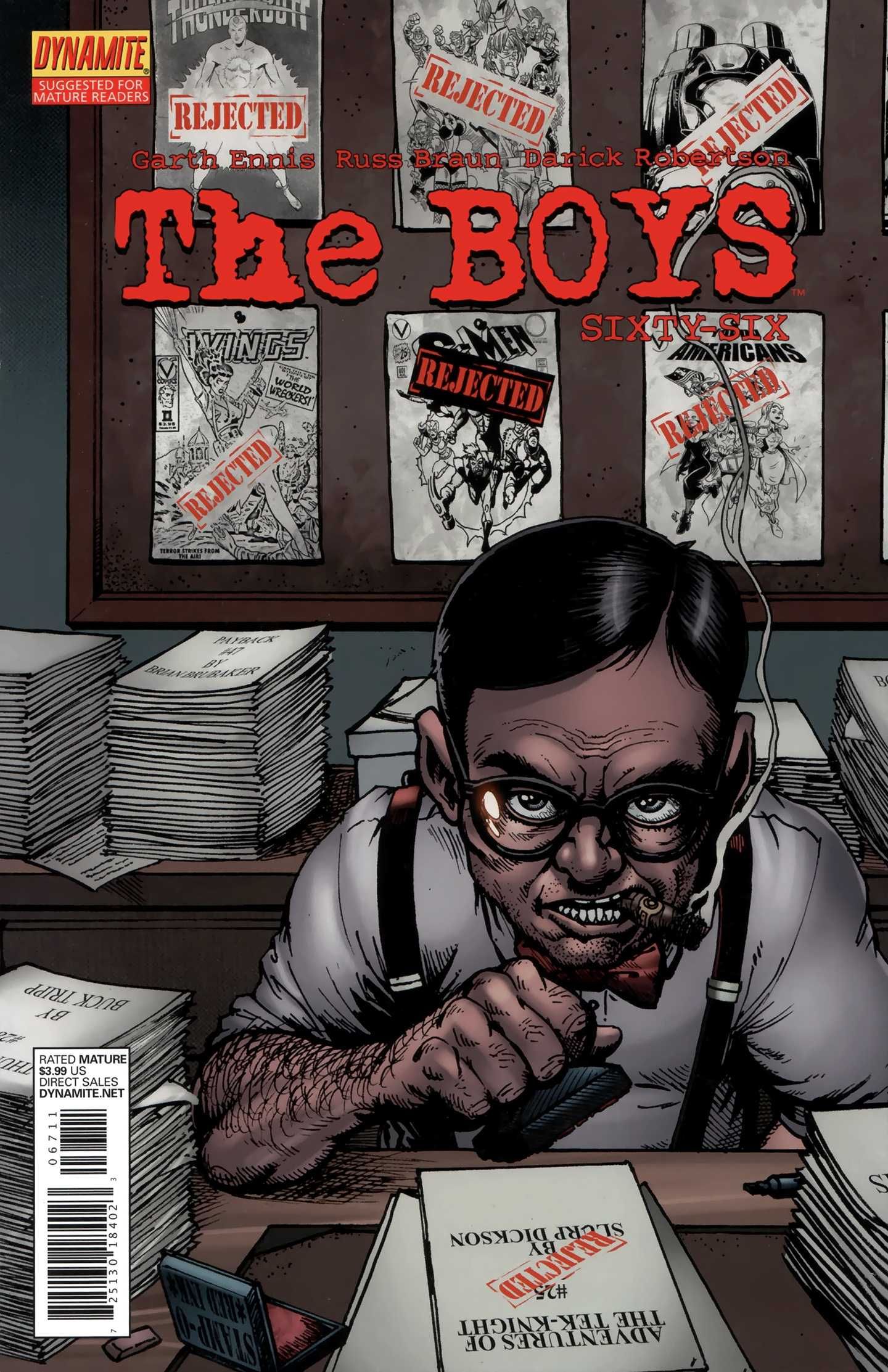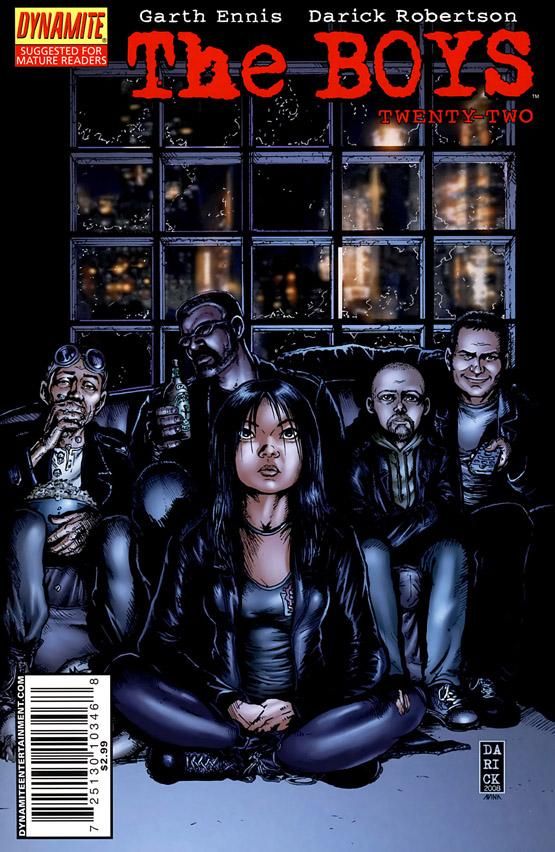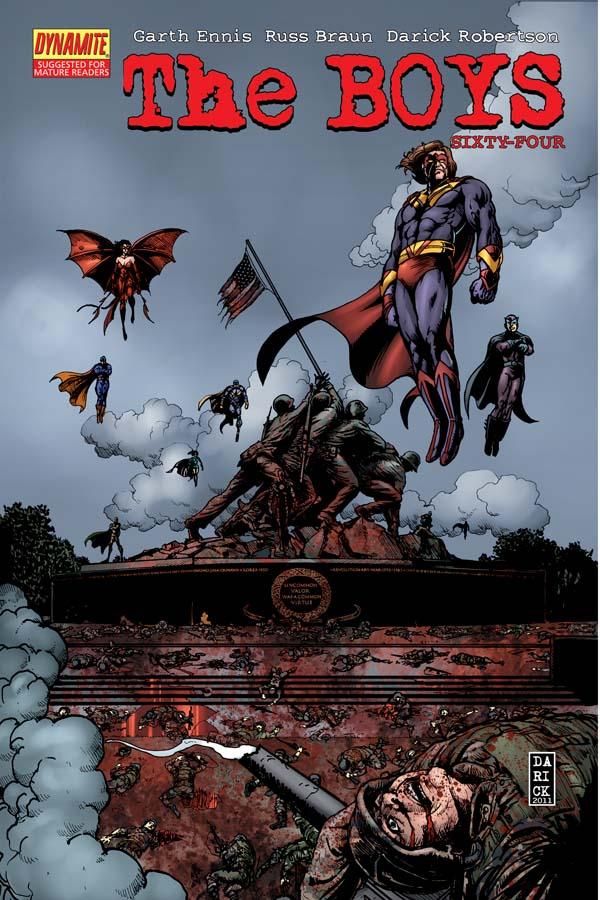2012 marked the end of one of the more notable and at times controversial superhero series in recent memory, The Boys. The monthly series, in which writer Garth Ennis and company cast a cold, satirical eye on the superhero genre and American culture, came to its natural conclusion a few months ago, though there didn't seem to be much talk about it on the Interwebs.
That being the case, I thought it might be fun (and hopefully enlightening) to start up some sort of discussion about the series, so I ensnared JK Parkin, one of the few people I know who has read the entire thing, to do a little Q&A with me. I think it turned out pretty well. Click on the link below to see if you agree with my assessment.
*****
MAUTNER: To begin with, I should confess that this is actually the first major Garth Ennis work I've read all the way through. Actually, it's the first time I've spent ANY serious time with Ennis' work. I haven't ready any of Hitman, Hellblazer, Wormwood, Crossed, The Pro or his run on Punisher. I've only read one or two issues of Preacher and a few war stories.
I'm not sure what it was about The Boys that made me decide to make it my first entry into Ennis-land. Perhaps the fact that it was billed as a superhero parody, which -- as tired as that subgenre is -- at least offers a certain point of familiarity? I really hope that's not the case because I don't want to think about what that says about me as a reader. Perhaps it was just that I felt an interest delving more into Ennis' work and The Boys just happened to come along at the right time? I dunno.
But how familiar are you with Ennis' work? Do you consider yourself a fan? If so, where would you place The Boys in relation to the rest of his bibliography?
PARKIN: I was a fan of both creators before reading The Boys, and they were my draw to the series when it first came out. My first exposure to Ennis was his run on Hellblazer, which really won me over, and I also read his runs on Hitman and the Punisher, as well as various minis and one-shots along the way, like Thor: Vikings, The Pro, etc. Hitman in particular I really liked, as it came out at a time when a lot of superhero comics just weren't that appealing to me, and it had that same subversive approach to the superhero genre that The Boys had ... although it was a DC Universe title, so it wasn't quite dialed up to the degree that The Boys was.
I first became a fan of Darick Robertson during his run on New Warriors, followed by Transmetropolitan, Wolverine and Nightcrawler. So seeing both their names on a book coming out from Wildstorm? Sold.
As for where I'd put The Boys in terms of his overall body of work, it's hard to say ... having never read Preacher, I feel like I'd be making the list prematurely based on all the praise it has received. I'm not sure why I never picked up Preacher when it first came out. I mean, I like the Ennis/Dillon run on Hellblazer, plus I was probably buying a bunch of Vertigo titles at that point anyway, but I never bought it until the first hardcover came out a year or two ago. Which I really liked, BTW, and I still plan to read it all at some point. For now, though, I'd say The Boys is probably near the top in terms of his work that I've read.
In terms of his "superhero" work, I'd definitely put it over Hitman, even though I still have a lot of love for that series. And I use the term superhero loosely here, as in both Hitman and The Boys (and maybe you could even include some of his Punisher work here, esp. that one issue where the Punisher took on Wolverine) you've got these regular joe types who are a bit shady and definitely flawed, but still come across as more likable and sympathetic than the heroes they encounter ... the "superheroes" are either the butt of the joke (as they were many times in Hitman) or the actual "bad guys" like they were in The Boys.
So let's talk a little bit about characters in The Boys, because I think for me, even beyond all the insanity and "oh shit" moments that the book contained, what really kept me coming back where the characters and their relationships, like the whole Butcher/Hughie dynamic, the Hughie/Annie relationship, etc. The first half of the Butcher Baker mini, before they even introduced the superhero element, was some pretty strong stuff (and made what you knew was coming for Becky all the more horrifying).
MAUTNER: Yes, absolutely. I was especially taken by the relationship between Annie and Hughie. Indeed, that proved to be the central draw of the comic for me, to the point where about 2/3 of the way in, when the focus was taken off that relationship, I found my interest waning. Even though I suspected from the moment they met how things were going to turn out (and I wasn't too surprised) I found myself deeply invested in their romance and wanted it to succeed in spite of everything. For all the violence and gore in this series, I think the issue where Hughie breaks up with Annie is the most upsetting and memorable. Well, perhaps not as upsetting as the 9/11 issue, but it's certainly up there.
Annie in particular proved to be an interesting character. At first she comes off as a naive goody-two-shoes, but she proves to be a lot smarter and more resilient than first impressions would suggest. I thought Ennis did a really good job developing her character throughout the run of the series, making her both likable and sympathetic, and I actually think her absence toward the end hurt the series a bit.
The relationship that intrigued me the most toward the end was the one between the two Vought American characters, Stillwell and Bradley. I found myself really engrossed in their back-door dealings and was taken aback by Stillwell's betrayal at the end. Again, while there were certainly a lot more bloody sequences, I literally cringed at that final scene where Bradley realizes what has happened to her.
The Butcher/Hughie dynamic was compelling, but not as interesting or compelling to me as that of Hughie/Annie, perhaps because the mentor/neophyte relationship is a pretty familiar one, and I could see pretty early on that Hughie was at some point going to have to face off against Butcher. It certainly seems like a dynamic that interests Ennis, though. I recently read the first couple of issues of Fury Max and could see a similar relationship between Fury and the young CIA operative in that comic.
You said you came on in part because of Robertson's work so let me ask you: What did you think of the work by the other artists on the series, namely Rick Braun and John McCrea? I thought Braun did a decent job, but didn't have the gift for exaggerated expression and a slick sort of caricature that Robertson does. And while I know McCrea has worked with Ennis on a bunch of projects before, I thought his work seemed particularly ill-served with this type of material, though whether that's because of production deadlines or other behind-the-scenes problems is up for debate. I don't like to rag on artists, but there were a number times when all the shifting -- and, I thought, often lackluster -- art styles hurt the book enough to make me consider dropping it. Did you have a similar reaction at all?
PARKIN: At some point I wanted to ask you about your biggest "Oh shit" moment of the series, and I imagined it being something disturbing or disgusting, but I think you're right -- the hits that were delivered emotionally were probably harder to take than the disgusting stuff. Like the Hughie/Annie break-up ... I really hated Hughie at that moment; like you, I really dug Annie. Or when Butcher read Bethany's diary in the Butcher Baker miniseries, which I thought was handled really well ... the prose seemed to spare us from witnessing the whole act, almost like the creators made the conscious choice to protect Bethany from the indignity of it all. Ennis is good at this sort of thing; Hitman, I remember, had just as many moments that made you tear up as it did the outlandish stuff.
As for your question about the artists, I never considered dropping the book, but I was disappointed that the choice to use other artists had to be made. I don't have any particular problems with the artists they chose -- I liked McCrea's work on the Herogasm miniseries in particular -- but the series to me always felt like it was an Ennis/Robertson joint, and I think ultimately it would make for a satisfying read end-to-end if it had that consistency. One of my issues with the series is that two of the miniseries (and possibly all three, depending on how you look at it) are pretty crucial to the overall plot. I don't think you could read the whole series without reading Herogasm and the Butcher Baker minis, and still come away with the whole story.
So I guess my question there is, why even do separate miniseries? Why not just work them into the regular series? Robertson stepped away from the monthly book to focus on Butcher Baker, but really it seems like that mini could have just been six more issues of the regular title. I think the trades are even numbered that way, with Herogasm being volume five of The Boys series of trades vs. being its own stand-alone thing.
So I didn't have an issue with who they brought in as fill-in artists, but the fact that they brought in anyone else at all. I would have been fine with a delay or a hiatus in the regular series if that meant Robertson got to tell the whole story. Because ultimately, at the end, we'd be left with a more rewarding series or collection of trades or omnibus edition or whatever, and those delays would be forgotten.
Getting back to the work itself, I will ask: what was the biggest "Oh shit!" moment for you, besides any of the emotional stuff we've talked about? For me it was probably the scene with Hughie and Mother's Milk's mom.
MAUTNER: Yeah, I didn't like it as a kid reading Marvel comics when I bought a "fill-in" issue by mistake or found that say, Ron Frenz, had been replaced on Amazing Spider-Man by ... well, someone of a lesser quality, and I like that kind of thing even less now. I'm used to waiting years for the next Dan Clowes or Chris Ware book; I don't mind waiting a few months so Robertson can get caught up to speed.
Obviously I can't speak for Ennis, but I suspect one of the aesthetic reasons for doing the minis is that it gives readers the chance to follow the series on an almost weekly basis, as though you were watching a weekly television show. Of course, I'm sure Dynamite liked it because it enabled them to make more money. Like you, I would have been just happy if the whole thing had run as one series, and they had opted not to do the spin-offs.
Apart from the stuff I mentioned, the two big "oh shit" moments were probably the "9/11" issue, where the Seven attempt to thwart the terrorist hijackers only to have everything go horribly wrong; and the end of the "We Gotta Go Now" arc, where not only does the Professor X character turn out to be a reprehensible human being, but the entire group of X-Men stand-ins die an unbelievably gory, fiery death. The latter in particular affected me in the way it both gave readers exactly what they want (blood and violence) and subverted that by presenting it in such a devastating and massive fashion. Both were pretty indelible sequences.
Given that we both feel the series' emotional drama was one of its major selling points, how did you think The Boys worked as a satire of superhero comics? I'll be honest: I think this was one of the weakest aspects of the series. Ennis seems to prefer the sledgehammer approach when it comes to humor and I think this type of thing tends to require both the obvious and subtle approaches. Indeed, it seems towards the end that Ennis was more concerned with building up that world and developing the characters more than making jokes about guys in tights. Do you agree?
PARKIN: For the most part, yeah, I'd agree. I think there were a few subtle touches I appreciated -- for instance, Superduper, the "slow" superhero team, I kind of took away as being a nod to Silver Age heroes, and thus their purity of motive meant they were spared -- but for the most part, Sledgehammer City. I don't know if that's really a failing of the series, though; if it was trying to be more of a satire, I don't think the elements we liked would have come across as well as they did.
I was thinking about the one-dimensional nature of a lot of the heroes, as the typical superhero in the book was basically a sex-starved frat boy at a kegger. I'm not sure they needed to be more than that, though. Painting them as anything else could have made them sympathetic, which would have defeated the purpose of The Boys.
Also, I wanted to get your take on the last story arc, after The Boys basically fulfill their mission and Butcher turns on them. Was that what you expected, and did you think it worked?
MAUTNER: I did see it coming. Honestly, I felt like Ennis telegraphed it pretty early. Not Butcher's exact plan per se, but more that he was planning something darker and potentially bloodier than whatever his de facto line was. That opening image was of him crushing a superhero's head with his boot, after all. It was clear from the first or second story arc that Butcher was not to be completely trusted. The revelation of Black Noir's secret identity was more of a surprise to me.
Overall I think it worked alright. There was part of me that was wondering if Ennis would make Butcher more vicious and hateful in the final arc, but he is clearly too ambivalent about the character to do something like that. As I said, in the end I was more intrigued by the machinations between the two Vought-American employees and disappointed that Annie was out of the picture for the bulk of the finale.
Actually, the ending brings to mind a question I had regarding Ennis' critique of superheroes. It's clear by the end he's directly calling out Marvel and DC when the VA exec bemoans the "bad product" he's saddled with. Do you think his critique is warranted? Are superheroes a fundamentally stupid, violent genre that leaves little save for diminishing returns or is he missing some fundamental appeal?
PARKIN: I thought for sure the end would come down to Hughie vs. Butcher, with Hughie protecting Annie. I guess in a way it did, but I expected it to be more overt. Still, the finale at the Empire State Building worked for me. Ennis has said that the Hughie/Annie relationship wasn't planned from the beginning, and just sort of grew as he was telling the story. So given that he had the end in mind from the get go, it makes sense that she wasn't a big part of it.
As for Ennis, superheroes, Marvel and DC ... your question brought to mind a fairly recent panel report from the Baltimore Comic Con. He said Marvel and DC are basically putting out the same thing over and over again, and people will buy it. That's the sentiment I took away from the couple of pages in the last issue on the "True" heroes. "That one is plainly The Deep." That is a great scene, actually, especially that line.
But I still think there's more to them than just being a fundamentally stupid, violent genre ... but you could probably guess that from my Food or Comics? picks every week. Some comics try their best to make it really, really hard to believe that, but then again, some make it pretty easy.
You said at the beginning that you hadn't read much Ennis. Now that you're done with The Boys, do you have plans to read any of his previous stuff? I've only read a little Preacher, and I think I might revisit that again sooner rather than later.
MAUTNER: Yeah, I'm definitely going to be checking out more Ennis now. I recently bought the first trade collection of Fury Max, which so far I'm actually liking even more than The Boys; I really like Goran Parov's art and I think Ennis is able to make his points about war and politics better in a more realistic setting (which seems odd to say about a Nick Fury comic, but there you have it). I hope to start delving into Preacher and his Punisher run in the new year.
I confess, I had a reason for my previous question about Ennis' thoughts re: superheroes, 'cause I think there's a bit of a contradiction or at least ambivalence in the character of Butcher, who, really, is just as violent and destructive as the heroes he hates, but, because he's more principled, or, perhaps, more self-aware, Ennis can't bear to make him too much of a villain. Hughie's comment at the end amounts to, "Well, he was a vicious guy, but he got things done," which could be criticized as a bit of a cop-out. I'm not necessarily saying it is, but part of me does feel a reluctance on Ennis' part to fully come down too harshly on Butcher in Hughie's end summation. Does that make sense?
PARKIN: I've seen the Fury Max book popping up on several "best of" lists recently, so I'll definitely check out the first trade.
Yeah, that makes sense, but I guess I had a different take on it and didn't really see it as contradictory. I think going into his war with the superheroes, Butcher knew he was going to get his hands dirty and basically become what he had learned to hate -- which is why he brought in Hughie. He knew he was creating this super-team of broken people to take down super-powered, broken people, and he wanted an "out" for when it was all over ... kind of a "Who watches the Watchmen?" scenario. It seems like a lot of the missions he sent Hughie on were meant to test him, not so much to see if he could hang with the rest of The Boys, but to see if he would remain "Hughie" in the face of some pretty harsh situations. So I guess I did see Butcher as the "villain" in the final arc, and he had set up Hughie as the hero to stop him. I think that stayed true to who Butcher was, too ... a manipulator and an ass, but still committed to his overall objective. At least, that was my take on it.
MAUTNER: That's a good point, and I think that's definitely the overall "take" intended by Ennis, Robertson and company.
I feel like I've come off as overly critical of the series in this back and forth and really, I did like The Boys. I think at its best it was a thoughtful and surprisingly moving examination of power, corruption and the modern business world with some really well-developed characters and memorable scenes. That's such a rare thing in serialized comics these days, let alone in most superhero comics, that I can't say I regret being along for the ride, even when I thought it hit choppy waters.


